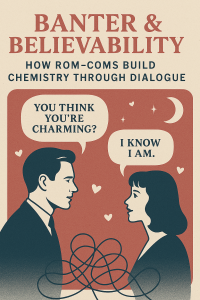Banter & Believability: How Rom-Coms Build Chemistry Through Dialogue

Romantic comedies aren’t just about love—they’re about spark. That electric tension between two characters who might not know they’re perfect for each other yet, but we do. And the secret ingredient? Banter.
Whether it’s witty repartee, awkward misunderstandings, or slow-burning vulnerability, rom-com dialogue teaches us how rhythm, tension, and emotional payoff create chemistry we believe in.
Let’s break it down.
 The Anatomy of a Meet-Cute
The Anatomy of a Meet-CuteThe meet-cute is the rom-com’s ritual initiation. It’s where two characters collide—often literally—and the audience leans in.
Common meet-cute tropes:
Accidental collision: Spilled coffee, mistaken identity, elevator malfunction.Opposites clash: Type-A meets chaotic creative.Shared dilemma: Both need the same apartment, dog, or wedding venue.What makes it work:
Contrast: Their differences spark tension.Timing: The moment feels fated, not forced.Dialogue: Banter begins here—playful, defensive, curious.“You stole my cab.”
“Technically, I opened the door. You just weren’t fast enough.”
 Banter as Foreplay: Rhythm and Reversal
Banter as Foreplay: Rhythm and ReversalBanter isn’t just clever—it’s rhythmic. It mimics flirtation, challenge, and emotional testing.
Key Elements of Banter:ElementWhat It DoesExampleReversalFlips the power dynamic“You think you’re charming?” “I know I am.”CallbackReferences earlier jokes or moments“Still stealing cabs?”InterruptionsBuilds tension through unfinished thoughts“If you’d just—never mind.”VulnerabilityCracks the armor, deepens connection“I pretend I don’t care. But I do.”Banter works when it reveals character—not just cleverness.
 Misunderstandings: The Shadow of Romance
Misunderstandings: The Shadow of RomanceRom-coms thrive on miscommunication. It’s frustrating, yes—but also human.
Types of misunderstandings:
Assumptions: “She’s dating someone.” (She’s not.)Secrets: “He’s hiding something.” (It’s a surprise proposal.)Timing: “They finally get it—too late.”These moments test emotional stakes. They ask:
“Will they fight for clarity?”
“Can they risk being wrong?”
 Emotional Payoff: The Moment It All Lands
Emotional Payoff: The Moment It All LandsThe best rom-coms earn their endings. The final confession, kiss, or reunion only works if:
The tension has built: We’ve seen the struggle.The vulnerability is real: They’ve dropped the mask.The rhythm shifts: Banter slows, emotions rise.“I thought I was better off alone. But then I met you—and now I know what lonely really feels like.”
 Writing Romantic Tension: A Mini Guide
Writing Romantic Tension: A Mini GuideWant to write your own rom-com magic? Try this:
1. Character ContrastGive your leads opposing traits or values. Let them challenge each other.
2. Dialogue BeatsWrite short, punchy exchanges. Use interruptions, callbacks, and reversals.
3. Emotional UndercurrentEven in banter, hint at deeper longing or fear.
4. Misunderstanding MomentInclude a scene where they misread each other. Let it hurt.
5. Payoff SceneSlow the rhythm. Let them speak plainly. Make it earned.
 Bonus Prompt: Banter Practice
Bonus Prompt: Banter PracticeWrite a scene where two characters meet at a bookstore. One is looking for a breakup recovery guide. The other recommends a rom-com.
Let the dialogue do the flirting.



